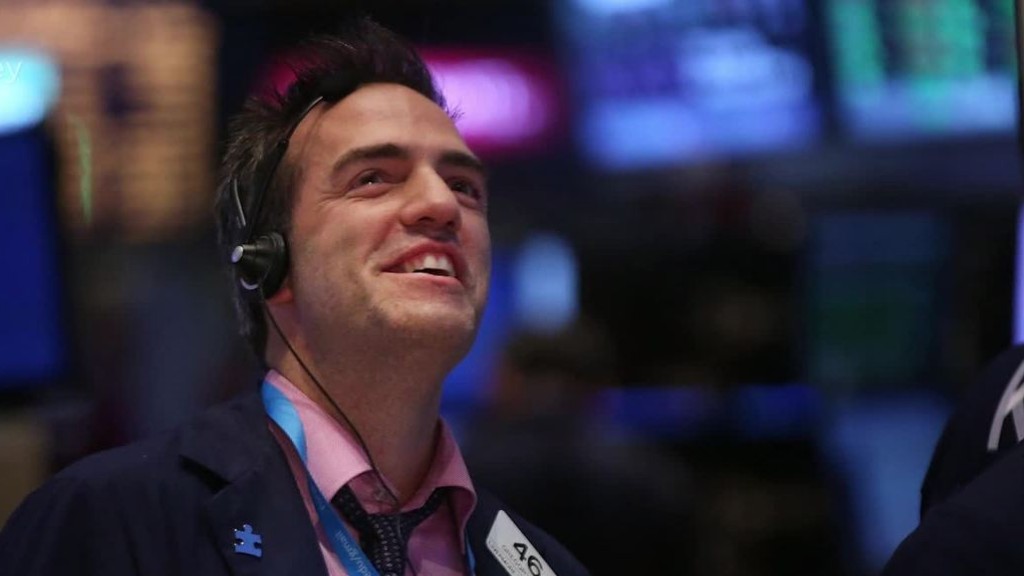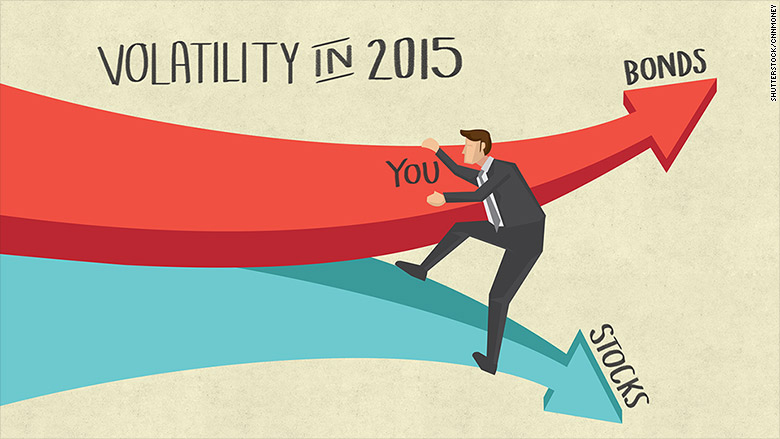
The stock market is calm. This spring has been one of the most tranquil periods for American stocks since the 1960s.
But things look too calm amidst a slew of warning signs.
At the top of the list: stocks are strangely quiet while bonds are going for rocky ride.
The concern is not if stocks will become more volatile like bonds -- it's just a question of when.
The calm before stocks' storm? Generally, when stocks or bonds become volatile, the other one hits rocky seas too. But not in 2015. Stocks are chilling out more and more while bond volatility is rising.
Later this year -- perhaps when the Federal Reserve raises its key interest rate -- volatility for stocks and bonds could both pick up, triggering a big sale, experts say.
"The risk here is that stock and bond volatility both pick up in tandem as they both sell off in tandem," says Jeff Weniger, portfolio manager at BMO Global Asset Management in Chicago. "That's what keeps me up at night."
Two major forces are at play that could be the tipping point: American stocks are pricey and central banks are taking big actions again.

Related: The next big bubble: Bonds, startups, China?
How calm is it: The difference between the high and low in the S&P 500 over the last two months is only about 4.2%. That's nothing. It's the smallest range since 2006 and is on par with the early 1960s, according to Dan Greenhaus, chief strategist at BTIG Research.
Another way to illustrate just how quiet it's been in the market is to look at the stock market volatility index, the VIX. It hit 81 during the financial crisis. In January, the VIX was 19. Now it's a mere 13 -- close to its record low.
The quiet is eery because almost everyone is talking about how expensive U.S. stocks are. One yardstick for the S&P 500, the price-to-earnings ratio, is about 20 right now. That's several points above the historical average of 15 to 16. It's also notable that the P/E ratios for most European and emerging markets are in the mid-teens, meaning they're cheaper.
It's a bit like gravity: at some point, people expect U.S. stocks to get a reality check and drop. But so far, investors are still giddy for American stocks.
The markets haven't seen a correction -- when they drop by 10% or more from their peak -- since 2011. Historically, that's a long time without a correction, which only builds investors' speculation about the next one.
One preview of stocks' future could be bonds.
Related: Dr. Doom: This 'time bomb' will trigger next financial collapse
Bonds' big day on the horizon: Bond investors look frazzled. The yield on the 10-year government bond has been making major swings.
The bond equivalent of the VIX is known as the MOVE index. It averaged about 85 in May, up from the low 70s where it was at the beginning of 2015.
Investors don't know how to read the Federal Reserve's plans to increase interest rates for the first time in about a decade. And while the Fed wants to hike rates, other central banks are cutting theirs.
Europe's central bank, like China's too, already lowered interest rates and started pumping money into its economy. The Fed stopped the easy-money party in October and it's expected to raise interest rates sometime this year.
The Fed's rate hike could jolt bonds into more rocky territory. When then-Fed chair Ben Bernanke announced the beginning of the end to the easy-money party, the so-called "taper tantrum," in the summer of 2013, bond volatility hit 100.
And where was it right before the Fed's taper tantrum? About the same where it is today, according to Bank of America Merrill Lynch data.
What now? Some believe it's just a matter of time before stocks and bonds get back together in the volatility van.
"Volatility will pick up," says Weniger. "A lot of this industry is moseying along without nary an idea that a correction that could be coming."
Weniger's suggestion: consider putting some investing cash overseas. International stocks are cheaper and more fairly priced.


